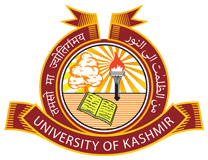General Information
The University of Kashmir, informally known as Kashmir University (KU), is the premier public State University in the Kashmir valley. Its story begins in 1948 with the founding of the University of Jammu & Kashmir. In 1969, this entity was bifurcated into two separate, full-fledged universities: the University of Kashmir (Srinagar) and the University of Jammu.
As the leading institution in the region, KU's mission is to be a center of excellence in teaching and research, catering to the educational needs of the Kashmir valley and beyond. It operates as a teaching-cum-affiliating university. It runs a large number of postgraduate and research departments on its main campus (Hazratbal) and satellite campuses (North, South, Kupwara, Zakura). It also provides academic governance and awards degrees to numerous constituent and affiliated colleges across its jurisdiction.
Key Recognitions:
Established by a State Act (now under the UT of J&K).
Recognized by the University Grants Commission (UGC) under Section 12(B).
Holds the highest 'A++' Grade accreditation from NAAC (National Assessment and Accreditation Council) as of its latest cycle.
Consistently ranked by NIRF (e.g., Ranked 34th among universities in NIRF 2025, an improvement from 45th in 2024).
Holds necessary approvals from professional bodies like AICTE (Engineering), BCI (Law), PCI (Pharmacy), NCTE (Education) for its relevant programs or affiliated colleges.
MCI Recogination
Permitted u/s 10(A) for 2020-21, Permitted for Renewal of 100 seats for the academic year 2022-23. Permitted (3rd renewal) and 4th batch for the Academic Year 2023 - 2024. Annual renewal permission granted for 100 MBBS seats for AY 2024-25.
Campus Facilities
The Campus: Lakeside Serenity in Srinagar
The main campus of Kashmir University is renowned for its stunning location.
Location: Situated in Hazratbal, Srinagar, Jammu & Kashmir, famously located on the western bank of the picturesque Dal Lake and near the Nigeen Lake.
Campus Size & Vibe: The main campus (comprising Hazratbal, Naseem Bagh, and Mirza Bagh) spans over 260 acres. It's known for its beautiful, tranquil environment with majestic Chinar trees, gardens, and scenic lake views, providing a unique and inspiring academic atmosphere. It also operates satellite campuses in Anantnag (South), Baramulla (North), Kupwara, and Zakura to improve accessibility.
Infrastructure & Facilities:
Allama Iqbal Library: A major central library spread over multiple floors, with a vast collection of books (6,00,000+), journals, manuscripts, and extensive digital resources (including a Braille section and access to J-Gate/UGC-INFONET).
Academic Schools/Departments: Numerous buildings housing its 14 Schools (like Arts, Business, Law, Engineering, Sciences, Social Sciences, etc.) and their constituent departments.
Laboratories: Well-equipped labs supporting teaching and research in diverse science disciplines (Physics, Chemistry, Life Sciences, Computer Science, Geo-Informatics, Pharmaceutical Sciences) and technology.
Learning Spaces: Modern classrooms (many with smart boards), lecture halls, seminar rooms, and auditoriums.
Residential Life: Extensive and separate hostel facilities for boys and girls.
Amenities: Health Centre providing medical facilities, bank/ATMs, post office, guest houses, canteens, university transportation (shuttle service), and comprehensive sports facilities (cricket ground, football, hockey, volleyball, gym).
Hospital & Medical Facilities
Leading tertiary care hospital attached to the institution
Healthcare Connection: Affiliating Role for Medical/Dental
It's important to understand KU's role in health education.
No Constituent MBBS College: Kashmir University does not have its own constituent Medical College offering the MBBS degree or operate its own large general teaching hospital for this purpose.
Affiliation Role: The university acts as the affiliating university for health science colleges within its jurisdiction (Kashmir division). This includes:
Medical: Government Medical College (GMC) Srinagar, GMC Baramulla, GMC Anantnag, GMC Doda, GMC Handwara.
Dental: Government Dental College (GDC) Srinagar.
Health-Related Programs (On Campus): The university's own campus offers strong programs in Pharmaceutical Sciences (B.Pharm, M.Pharm), Biochemistry, Biotechnology, Clinical Biochemistry, Microbiology, and Nursing (check if B.Sc Nursing is on campus or affiliated).
Health Centre: Provides basic medical support to the campus community.
Fee Structure
State University Affordability
Fee Structure: State University Affordability
Being a state university (operating as a central university in practice post-UT formation, but with state-level fee norms), Kashmir University's fees for its regular, government-aided programs on campus are generally very affordable. Self-financed courses (like B.Tech, MBA, BA-LLB) have higher fees, but are still significantly lower than private universities.
City Details
Hostel & Mess
Campus Living: Hostel Life at Kashmir University
Kashmir University provides residential facilities, primarily for students enrolled in its on-campus (mostly PG) programs.
Availability: Yes, the university has separate hostel blocks for boys and girls on its main campus (Mirza Bagh) and potentially satellite campuses. Allotment is highly sought after and based on merit, category, and distance from Srinagar.
Facilities: Hostels offer basic furnished accommodation (typically 2-4 sharing rooms), common rooms, reading rooms, mess facilities, 24/7 security, warden supervision, essential amenities, and access to campus sports and health facilities.
Mess System: Each hostel operates its own mess, providing regular meals (Kashmiri and standard Indian cuisine) managed on a fixed-rate or dividing system.
Cost: As a state/central-level university, the combined cost for hostel accommodation and basic mess food is generally very economical. Expect annual charges (including mess) to be highly affordable, likely in the ₹20,000 - ₹35,000 range (Needs precise confirmation from the hostel authorities).
Miscellaneous
Admissions & Career Pathways: CUET & State/University Tests
Getting Admitted:
CUET is Primary (PG): Admission to most Postgraduate (PG) programs (MA, MSc, MCom, LLM, M.Ed, etc.) offered directly by Kashmir University departments is now exclusively through the Common University Entrance Test (CUET-PG), conducted by NTA.
CUET-UG (UG Campus Courses): Admission to on-campus Undergraduate (UG) programs (like Integrated PG, BA LLB, B.Pharm, B.Tech) is primarily through CUET-UG.
MBBS / BDS / MD / MS / MDS: Admission to affiliated medical/dental colleges is strictly based on rank in NEET-UG or NEET-PG/MDS, followed by centralized counselling conducted by the J&K Board of Professional Entrance Examinations (J&K BOPEE).
Affiliated Colleges (BA/BSc/BCom): Admissions are largely managed through the J&K Higher Education Department's Common Admission Portal, based primarily on merit in the qualifying examination (Class 12).
Ph.D.: Admission involves a separate University Entrance Test followed by interviews/presentations. NET/JRF/GATE/SET qualified candidates are usually exempted from the entrance test.
Always check the official University of Kashmir admission notification (kashmiruniversity.net) and J&K BOPEE/Higher Ed portal for the specific, current procedures.
Career Support (Placements):
Focus: Kashmir University has a dedicated Central Placement Cell. Career paths for graduates are diverse. Many excel in state/central government competitive examinations (KAS, IAS, Banking, SSC), academic careers (NET/SET for lectureship, Ph.D. for research – a major strength), and teaching positions.
Campus Placements: Direct campus placements are more common for professional courses like MBA (Business School), B.Tech (Engineering), MCA/M.Sc IT, MA (Mass Comm), and B.Pharm. Recruiters often include J&K Bank, HDFC Bank, ICICI Bank, regional IT/service companies (TCS, Wipro, Infosys), media houses, and educational institutions.
Outcomes: Placement success varies. The median package for PG (2-year) programs was reported around ₹7 LPA in NIRF 2023, which is strong. The university's high academic standing provides an excellent credential for higher studies and competitive exams, which remain major aspirations for a large number of its graduates.
Information for NRI / Foreign Nationals
Kashmir University has specific provisions for admitting international and NRI-sponsored students.
Collage Images Gallery
Facilities & Campus Life
Well-equipped Library
Experienced Faculty
Computer Lab
Sports Activities
Heritage Campus
Frequently Asked Questions
Why Consult With Us?
- 15+ years of experience in medical education counseling
- 5000+ students successfully guided
- 50+ partner universities worldwide
- Free initial consultation with no obligation














